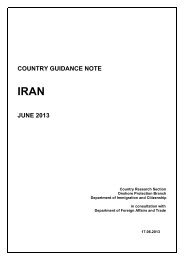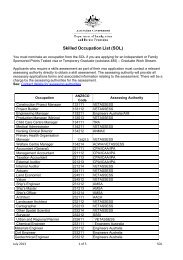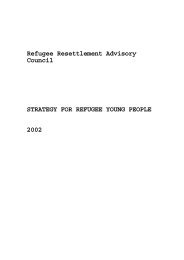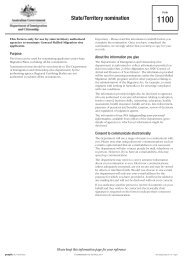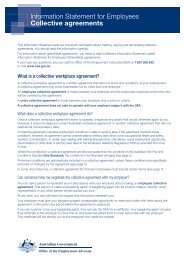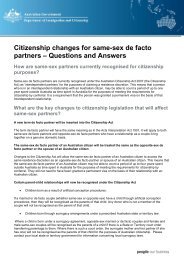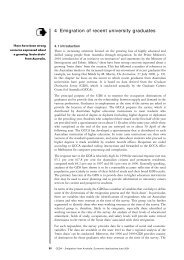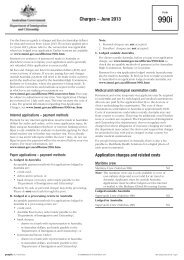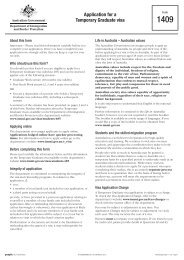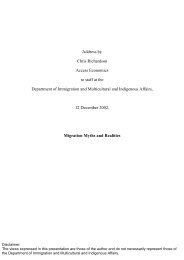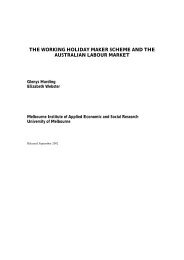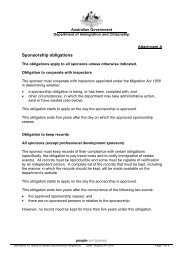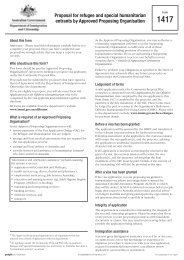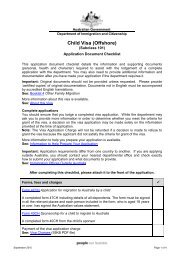Evaluation of the Integrated Humanitarian Settlement Strategy (IHSS)
Evaluation of the Integrated Humanitarian Settlement Strategy (IHSS)
Evaluation of the Integrated Humanitarian Settlement Strategy (IHSS)
You also want an ePaper? Increase the reach of your titles
YUMPU automatically turns print PDFs into web optimized ePapers that Google loves.
Recommendation 5<br />
Duplication<br />
There is a need to better align <strong>IHSS</strong> service providers with <strong>the</strong> CSSS, including clarification <strong>of</strong> roles in<br />
relation to longer term settlement, in order to avoid duplication.<br />
Recommendation 6<br />
Streamlining/Mainstreaming<br />
DIMIA at a national level, needs to work more effectively with representatives from o<strong>the</strong>r key<br />
(national) Commonwealth departments and agencies (eg Centrelink, Health Insurance Commission,<br />
DEWR) and with o<strong>the</strong>r sections within DIMIA (eg AMEP) to develop mechanisms for streamlining<br />
service provision. This ‘top-down’ effort would be directed at enhancing access to mainstream<br />
services by humanitarian entrants and facilitating action by service providers at a local level.<br />
4.5 O<strong>the</strong>r issues raised<br />
4.5.1 Administration/management<br />
Quality <strong>of</strong> information from Overseas Posts<br />
There was considerable criticism from service providers (and some clients) regarding <strong>the</strong> quality and<br />
accuracy <strong>of</strong> <strong>the</strong> information provided from Overseas Posts.<br />
Service providers complained that information about clients provided by Overseas Posts is <strong>of</strong>ten<br />
inadequate or inaccurate and that this tends to impede <strong>the</strong>ir preparation for <strong>the</strong> entrant’s arrival. In<br />
particular <strong>the</strong> special needs <strong>of</strong> clients, such as disabilities, illnesses or existence <strong>of</strong> young children,<br />
are <strong>of</strong>ten not communicated to service providers. This has meant, in a number <strong>of</strong> instances, that <strong>the</strong><br />
arrangements made for <strong>the</strong> clients prior to arrival are inappropriate and alternative arrangements<br />
have to be made post-arrival. Often this incurs additional costs and may mean that arrangements are<br />
unsatisfactory to <strong>the</strong> clients (eg quality or type <strong>of</strong> accommodation).<br />
It is not clear how widespread or frequent this problem is. Service providers gave a mixed picture <strong>of</strong><br />
<strong>the</strong> extent to which misinformation and <strong>of</strong>ten short notice <strong>of</strong> arrivals affected <strong>the</strong>ir work. Some<br />
reported that it was an inconvenience but <strong>the</strong>y were able to manage, while o<strong>the</strong>rs reported that <strong>the</strong><br />
problems occurred with a frequency that created significant difficulties for <strong>the</strong>ir staff. Correct<br />
information on <strong>the</strong> following issues was thought crucial:<br />
<br />
<br />
size <strong>of</strong> family – adequate accommodation and furnishings need to be provided, transport<br />
arrangements need to accommodate large families;<br />
age and gender <strong>of</strong> children and adults – to ensure appropriate accommodation arrangements<br />
30<br />
<strong>Evaluation</strong> <strong>of</strong> <strong>the</strong> <strong>Integrated</strong> <strong>Humanitarian</strong> <strong>Settlement</strong> <strong>Strategy</strong> 27 May 2003



